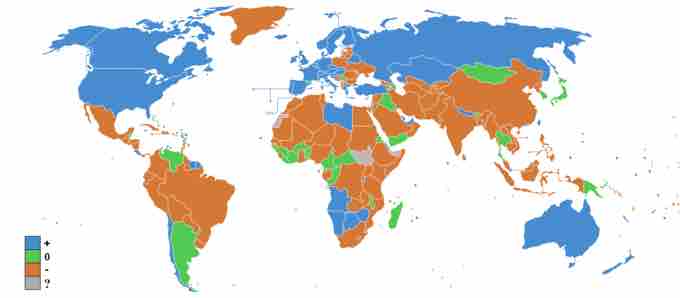Immigration
Immigration involves the movement of people from their home country to a host country, of which they are not native, to settle and live. People immigrate for many reasons; some of which include economic or political reasons, family reunification, natural disasters, or the desire to change one's surroundings.
In 2006, the International Organization for Migration estimated the number of foreign migrants worldwide to be more than 200 million. Europe, North America, and Asia host the largest number of immigrants totaling 70 million, 45 million, and 25 million in 2005, respectively .

Immigration Rates
This map shows the migration rates worldwide in 2011. The blue countries experienced positive rates, orange indicates negative rates, green shows stable rates, and the gray shows where no data was available. Immigration involves individuals moving from their home country to live in a non-native country. In 2005, Europe, the United States, and Asia had the highest levels of immigration worldwide.
Impacts on the Host Country
A host country experiences both advantages and challenges as a result of immigration. At certain times throughout history, larger migrations have taken place which created huge population surges. The higher population numbers placed strain on the infrastructure and services within the host country. When immigrants move to a new country, they are faced with many unknowns, including finding employment and housing, as well as adjusting to new laws, cultural norms, and possibly a new language. It can be a challenge for a host country to assimilate immigrants into society and provide the necessary support.
Immigration does cause an increase in the labor force. This can impact great quantities of them if the immigrants are generally the same type of worker (e.g. low-skilled) and immigrate in large enough numbers so as to significantly expand the supply of labor.
Immigration is still a heavily debated topic in many host countries. Some believe that immigration brings many advantages to a country both for the economy and society as a whole. Others believe that high immigration numbers threaten national identity, increase dependence on welfare, and threaten national security (through illegal immigration or terrorism). Another argument is that high immigration rates cheapens labor. Empirically, research has shown this may be partially true. The Brookings Institute found that from 1980 to 2007, immigration only caused a 2.3% depression in the wages of the host country. The Center for Immigration Studies found a 3.7% depression in wages during 1980 to 2000.
Impacts on the Home Country
The home country also faces specific challenges in regards to immigration. In many cases, immigrants move to another country to provide positive changes for their future. Reasons to immigrate can include the standard of living not being high enough, the value of wages being too low, a slow job market, or a lack of educational opportunities. A home country must analyze immigration statistics to determine and address why citizens are moving to other countries. In the long-run, large amounts of immigration will weaken the home country by decreasing the population, the level of production, and economic spending. If a country is losing citizens due to economic reasons, the situation will not improve until economic changes are made.
At times, citizens of a country may leave because of non-economic reasons such as religious persecution, ethnic cleansing, genocide, war, or to escape the government (for example, a dictatorship). In these cases, it is not uncommon for the citizens to return to the home country at some point once the threat is no longer present. While a citizen is living in another country, if they receive an education and create a solid life, their individual success can also be beneficial to the home country, if they use their acquired skills to make a difference. Many individuals do not forget their home country and continue to support family members financially through the income from the country they migrate to.